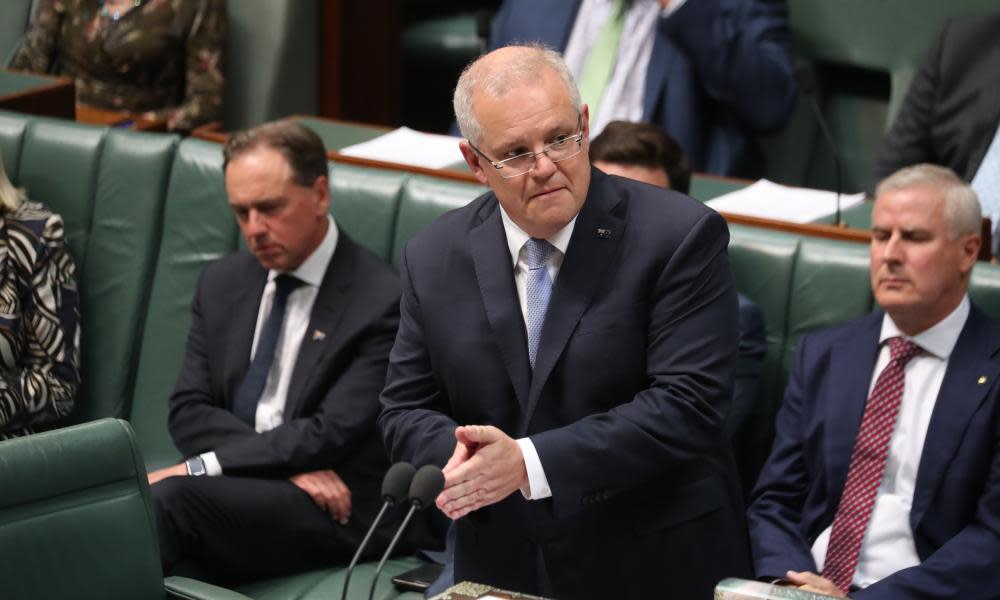Morrison admits there are climate costs, but won't say what 3C heating would do to economy

Scott Morrison has acknowledged there are “costs associated with climate change” but has declined to spell out what 3C heating would do to job creation and economic growth in Australia.
Ahead of the release of its technology roadmap, the federal government is attempting to ramp up political pressure on Labor over its commitment to a net zero target by 2050, blasting the opposition for adopting a target without a fleshed-out strategy to meet it, and pointing out that CSIRO research cited positively by Labor assumes a carbon price of more than $200 to drive the transition.
But the government is also having to fend off sustained questions about basic contradictions in its own messaging.
Related: Net zero emissions by 2050: is it a controversial ambition and will the Coalition adopt it?
In question time on Monday, Labor asked why the government was criticising the opposition’s 2050 target when the Paris agreement, which the current government signed and ratified, required carbon neutrality by mid-century. The emissions reduction minister, Angus Taylor, declared that was incorrect, because Paris involved “the world achieving net zero in the second half of the next century”.
The independent MP Zali Steggall – who is championing a bill to lock Australia in on a net zero target – also asked Morrison to detail the costs of inaction, given the government has been blasting Labor for days for failing to outline the cost of action.
In response to Steggall’s question, Morrison stepped around the specifics, but said “we do understand there are costs associated with climate change that we are indeed taking action on to reduce emissions”.
The prime minister said it was important to build resilience, and develop adaptation measures “to ensure that Australians can thrive in the climate we live in while taking the necessary action when it comes to emission reduction”.
During the run of questions on Monday, Morrison told parliament the government had “a clear plan” to achieve a 2030 emissions reduction target of 26%, without mentioning that almost 100 megatonnes of the Coalition’s proposed reductions are booked to unspecified “technology improvements” and additional pollution cuts are attributed to an electric vehicles strategy that the government has not yet announced.
The government is also counting, in its 2030 plan, a 367-megatonne contribution from carryover credits – an accounting system that allows countries to count carbon credits from exceeding their targets under the soon-to-be-obsolete Kyoto protocol periods against their Paris commitment for 2030.
The latest emissions data confirms pollution has dipped slightly on the back of new clean energy and a sharp fall from agriculture due to the drought, but the decline was almost entirely wiped out by surging industrial pollution.
While keeping all its options open, the government has been signalling for some days it is unlikely to adopt a 2050 target.
On Monday, the government attempted to ramp up a parliamentary attack against Labor’s proposal, contending such a transition would be devastating for sectors like agriculture. At one point, the deputy prime minister, Michael McCormack, asked Labor to “look a steer in the eye, and say how are you going to stop your methane!”
Asked repeatedly on Monday whether the government would nominate a long-term target, Taylor said the government would be “focusing on technology”.
After question time, the Labor leader, Anthony Albanese, said he was confident that championing a net zero position would not cost the ALP seats in Queensland at the next federal election.
He said if it was reasonable for Morrison to demand Labor to detail the costs of action, it was also reasonable to ask the government about the costs of inaction. “We saw a bit of the cost of inaction over the bushfire season, when we lost 33 lives, when we lost over 3,000 homes, when we lost 12 million hectares of land,” Albanese told Sky News.
“What we know is that the cost of that season certainly won’t be $2bn that the government talks about. We know the consequences of dangerous climate change are catastrophic for our economy.
“Global economists predict that the cost of a greater than 2C increase in global temperatures will be between 15 and 25% lower economic growth – a greater cost than we saw during the great depression.”

 Yahoo News
Yahoo News 
